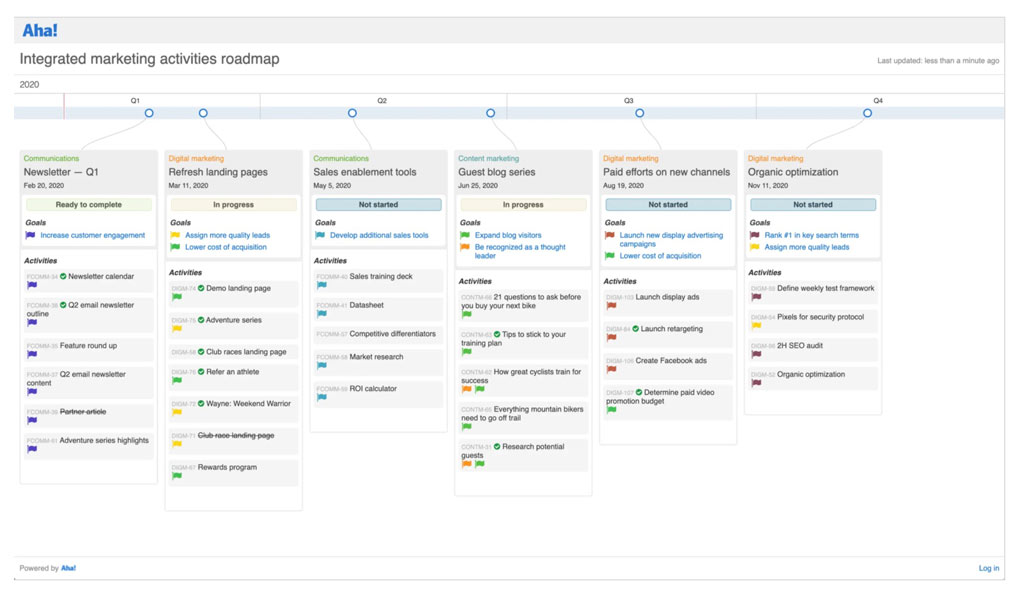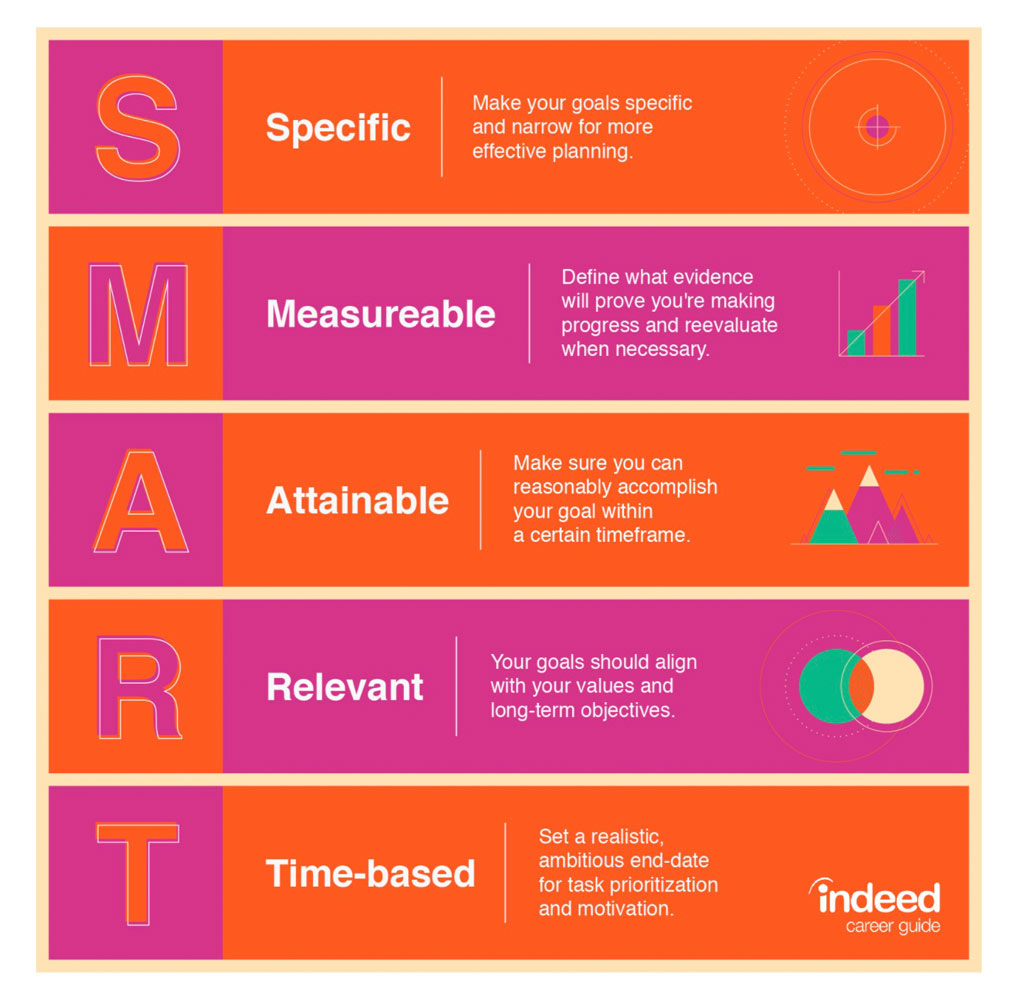About 61% of respondents on a workplace strategy survey said moving from forming a strategy to implementing it is a challenge. If your manufacturing business is among those that struggle to bring big marketing ideas into a reality, then consider creating a marketing roadmap.
Marketing roadmaps are guides that take your team from where you are now to your end goal through easy-to-follow steps, specific milestones, and SMART goals.
Key Takeaways
- Marketing roadmaps can improve workplace communication and productivity.
- Most marketing roadmaps have four parts: a specific goal, attainable milestones, detailed parameters, and a flexible schedule.
- A set plan helps motivate your team to accomplish your goals on time.
What a Marketing Roadmap Includes
A marketing roadmap includes creating strategies that build brand awareness, attract leads, motivate businesses to purchase from your manufacturing company, and follow up with business partners to develop brand loyalty.
Your marketing roadmap brings those strategies into fruition with an outline that includes a timeframe, specific goals, initiatives, schedules, activities, and the status of your goals. However, your final roadmap will look different depending on what you want to accomplish.
You may sort your roadmap tasks by objectives, team members, or dates. But the look is not as important as what is on the roadmap. That’s what we will explore in more detail.

Benefits of Using a Marketing Roadmap
A marketing roadmap can help you:
Synchronize Your Employees
A roadmap lets employees work towards a common end on the same timeline. Connected employees with open communication increase business productivity by 20-25%. With a plan that outlines each person’s duties and deadlines, teams can seamlessly move through tasks with fewer issues than teams working without knowing what other parts of the business are doing.
Present Ideas Visually
A roadmap also provides visuals and statistics you can use in business presentations for your company or stakeholders. It outlines your company’s future goals and overarching vision to show how your current actions connect to your end goals.
4 Parts of an Effective Marketing Roadmap
What is road mapping and how can it benefit your organization?
To create an effective marketing roadmap, you should:
1. Create a Precise SMART Goal
A roadmap starts at the end, which means you establish an end goal before beginning your strategy.
Here are some examples of general manufacturing marketing goals:
- Find more leads
- Grow your business’s revenue
- Improve your online presence
- Increase the number of conversions
- Expand your brand awareness
- Promote a new product
If you aren’t sure where to start when creating a goal, you can do the following steps:
Do a Marketing Audit
Begin with a marketing audit to find your business’s strengths and weaknesses. Then write up one or more goals using a method like the popular SMART goal strategy.

Write Specific Goals
Specific marketing goals use precise language. For example, instead of saying “Improve our online presence,” you could say, “Increase the number of web pages on our website.”
Measurable and attainable details give a specific number to aim for in your strategy. These numbers are essential for measuring your progress and success. For example, in the instance above, you could make that specific goal measurable by saying, “Double the number of articles we post on our website.” Then, add an achievable end date to motivate your teams to action.
Keep Goals Relevant
Relevant goals keep your business’s overarching mission in mind. For example, you wouldn’t center your goals around social media growth if most of the businesses you work with aren’t on social media. Instead, take the time to identify specific needs in your company and your audience before creating a goal.
Set a Deadline
Once you have a specific goal established, create a deadline to motivate your team. Deadlines help keep employees from procrastinating or losing motivation. They also give a sense of urgency to prioritize those tasks.
2. Schedule Project Milestones
Project milestones break a large task into smaller projects that are easier to handle. They also help your teams from falling behind in their duties, then scrambling at the end of the overall deadline, which may lead to quick, sloppy work.
In the example of doubling your article posts, you could create weekly milestones. A milestone may be “Create two articles for our company website each week.”
3. Establish Project Parameters
Your teams need to know what they should do and how to complete the task. By outlining project parameters and your marketing strategy, you keep all your teams on the same page and avoid your business inadvertently working against itself.
For example, if your goal is to create two articles a week, you should also give article details. Details could include post keywords, the audience you want to reach, and the topics you wish to cover.
If your content creators write articles geared towards CEOs of businesses while your creative team is designing images relating to business employees, you will send conflicting messages to your audience. A detailed project description will avoid those conflicts of interest.
4. Remain Flexible
If you are driving down a road and hit traffic, taking an alternate route would help you arrive at your destination on time. The same is true for your marketing roadmap. You should go into your goal expecting delays in the process.
A key to goal success is flexibility. Be prepared to adapt and change your strategy, deadlines, or goals to overcome any challenges along the way.
One of the most effective ways of managing your marketing roadmap is having an open communication channel between each team and the executives in your business. Through regular communication, your teams provide feedback when issues arise. Then, you can adjust your strategy before the project moves much further and causes greater problems.
For example, if your team is marketing a new product, they may realize the channels they are using aren’t reaching their intended audience. Through frequent feedback sessions and monitored milestones, you can catch this issue early. Then, you can switch the marketing channels so your teams can still meet their end goal without setting your plan behind schedule.
Move from Ideas to Strategies
A strong, well-planned marketing roadmap begins with an experienced strategy team.
A roadmap involves many moving parts and flexible scenarios. However, you don’t need to put those pieces together by yourself. Instead, you can have a strong team behind you who is on top of all the latest marketing trends for manufacturing companies.
Contact our staff to create SMART goals and attainable milestones so your company can experience exponential growth.

